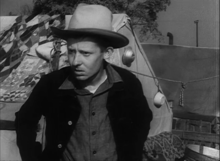O.Z. Whitehead
| O. Z. Whitehead | |
|---|---|

O.Z. Whitehead as Al Joad in The Grapes of Wrath
|
|
| Born |
Oothout Zabriskie Whitehead March 1, 1911 New York City, New York, U.S. |
| Died | July 29, 1998 (aged 87) Dublin, Ireland |
| Years active | 1935–1997 |
Oothout Zabriskie Whitehead (March 1, 1911 – July 29, 1998) was a stage and film character actor. He was born in New York City and attended Harvard University. Called "O.Z." or "Zebby", he also authored several volumes of biographical sketches of early members of the Bahá'í Faith especially in the West after he moved ("pioneered" as a Bahá'í) to Dublin, Ireland in 1963.
Whitehead first appeared on Broadway in Martin Beck Theatre performing in The Lake (1933) in 55 performances from December 1933 to February 1934 (which was Katharine Hepburn's first Broadway leading role) and 11 other plays by 1939. Hepburn encourages his early career.
O. Z. Whitehead was one of the last surviving members of John Ford's "stock company" of character actors. Along with John Carradine, Donald Meek, Ward Bond, Ben Johnson, Harry Carey, Jr. et al., Whitehead was one of the many actors regularly employed by Ford to breathe life into even the smallest roles in his films. His best-known part was that of Al in Ford's 1940 adaptation of John Steinbeck's novel The Grapes of Wrath.
The Scoundrel (1935) by Ben Hecht, and Charles MacArthur which won a 1936 Oscar for Best Original Story was Whitehead's first film. Whitehead most famously played Al Joad (Henry Fonda's younger brother) in John Steinbeck's Grapes of Wrath (1940) which was nominated for, and won, several Oscars. Whitehead starred as Clarence in a stage production of Life with Father with Lillian Gish among a total of more than 50 films and TV series episodes performances. Whitehead's first TV episode was The Arrow and the Bow in Cavalcade of America in 1953 and continued in other shows like Gunsmoke (1958), Bonanza (1960), and two episodes of Alfred Hitchcock Presents (1960-61). In 1961 he made a guest appearance on Perry Mason as murderer Harry Beacom in "The Case of the Cowardly Lion." Shortly thereafter Whitehead moved to Ireland and participated in theatre arts there.
...
Wikipedia
